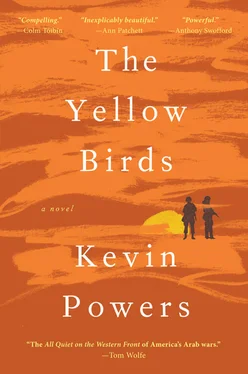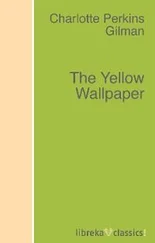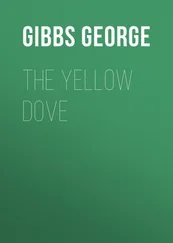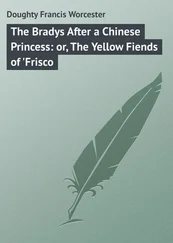I couldn’t think. I wanted to take it all back. “This is so fucked, Sarge.”
“Chill out, man. Just chill out, all right,” he said, and then paused reflectively. “Here’s what we do: you get on that radio and tell the terp to send over the hajji with the cart. Tell them we didn’t find him.”
I took a minute and collected myself. Sterling went on, “We’re gonna have to fix this like it never happened. You know what that means, right?”
“Yeah. I know.”
“You sure?”
“I’m sure.”
We waited. A strange peace took shape between us. The sun muted the periphery into a mere abstraction of color and shape. Everything we did not look at directly became a blur in the corners of our eyes. We watched the hermit come, tapping lightly at the haunch of his mule. He walked slowly in the heat and all that was clear in our vision was the man and his lame mule emerging out of a hazy mirage, everything else vague or inverted or duplicate. The mule treaded lightly on its tinkered foreleg, and the man patiently guided it toward us. As he came closer we saw that the two mutts from before loped along behind him. The hermit approached and looked each of us in the eye as if we were lined up for an open-rank inspection, and finally said, “Give me a cigarette, mister.” I gave him one and he lit it, inhaled deeply and smiled.
Sterling reached for Murph’s legs and tried to lift him up. We didn’t have the chance to take it back. We had never had the chance, not really. It was as if we had already done it in another life I could only vaguely remember. The decision had been made. I moved to where Sterling was and grabbed Murph by the arms. I shuddered quickly. My heart beat recklessly. We picked Murph up and brushed the dancing flies from his skin and tried not to look into his empty sockets as we laid him in the back of the cart among the clay and stone and the figurines of straw.
“We’ll take him to the river,” Sterling said. “We’ll leave him there. Give me your lighter, Bart.”
I did. He lit the Zippo and left it burning and dropped it into the dry brush at the base of the tower.
“Let’s go,” he said.
It was not far from the river, and we walked behind the hermit as he led the mule into some approximation of a trot. We followed behind this odd coterie of man and mule and dog for a half a klick or so, until we saw the banks of the river. Water lapped the edges and bulrushes swayed gently in the shallows at the banks.
Sterling tapped on my shoulder, pointed behind me, and I saw the minaret in flames from the dried brush burning at its base. Burn it. Burn the motherfucker down. The tower lit up like a flickering candle as the sun began to descend from its brutal apex. I thought for a moment that we might burn down the whole city for that one tower. I was briefly ashamed, but quickly forgot why.
Sterling looked at me and whispered, mostly to himself, “Fuck ’em, man. Fuck everyone on earth.”
Amen. We floated behind the cart down the broad avenue leading to the edge of the river. The street was lined with poplars and the bodies from our search; opaque shades of brown, all ages and species. We walked past many things in flames. The thin and knotty trees and flowers soaked up the fire and lined the avenue in the descending sun like ancient guideposts, all flaming and circling a little light on the scattered bodies, breaking up the dark.
We floated past the people of the city, the old and childless hovel dwellers who wailed some Eastern dirges in their warbling language, all of them sounding like punishments sung specifically for our ears. Daniel Murphy’s body in the cart reflected the orange glow, the only color on his thin and parchment skin was the flickering palette of the fire. The shadows danced on his pale form and only the listing of the broken mule and tottering cart made his body appear to move like something other than a canvas for this burning scene.
We walked the body in the cart down to the edge of the river. The hermit walked around to the rear of his cart, stroked the mule’s flank and then embraced Murph, lifting him out of the flat carriage. Sterling and I each grabbed a leg and we walked the last few steps to the river and laid him in. He floated off quickly in the steady current, and in the water past the bulrushes little pools formed where his eyes had been.
“Like it never happened, Bartle. That’s the only way,” Sterling said.
“Yeah, I know.” I looked at the ground. The dust blowing in fine swirls around my boots. I knew what was coming.
Sterling shot the cartwright once, in the face, and he crumpled to the ground. No time to even be surprised by it. The mule began to pull the cart, unbidden, as if by habit. The two dogs followed it into the coming night. We looked back toward the river. Murph was gone.
Fort Knox, Kentucky
Then it was spring again in all the spoiled cities of America. The dark thaw of winter fumbled toward its end and passed. I smelled it reeking through my window during that seventh April of the war, the third and last of my confinement. My life had become as ordinary as I could have hoped for. I was happy. The prison was only tier II, for convicts serving terms of five years or less, a Regional Confinement Facility, which all the Joes called “adult day care.” It made me laugh.
I had been pleasantly forgotten about by almost everyone. The staff allowed me to check out books from the moderately well run prison library. I learned that when I finished reading them they could be stacked on the metal desk that jutted out of the cell wall and I’d be able to look out the window, which was large enough to let in light but far too high to see out of without the aid of something else to stand on. I had a fine view of the exercise yard and the tree line past the concertina fence, which more or less marked the limit of the base’s prison grounds, for as long as I could balance on the ever-weakening bindings of whatever stacks of books allowed my looking. Beyond the tree line the dull world that ignored our little pest of a war rolled on.
My first few months inside, I spent a lot of time trying to piece the war into a pattern. I developed the habit of making a mark on my cell wall when I remembered a particular event, thinking that at some later date I could refer to it and assemble all the marks into a story that made sense. I still remembered what some of them meant for a long time afterward: that long chalky scratch below the mirror next to “FTA” stood for that kid whose head Murph cradled in the orchard as he died. The one above my bunk reflected an instant of thought I’d had in an alley in Al Tafar, in the heat of that first summer when the shade of webs of power lines were little blessings as we passed beneath them, and a corner was turned by whoever had been on point that day, and I saw Sterling as he turned around and waved for me and Murph to cross into the open road, and it occurred to me that Murph had had a choice, there were two paths he could have taken and I was one of them, and I asked myself if I could be worthy of that task, and wondered if that is what his mother meant when she asked me to take care of him, and is that why she asked? As I made my mark, if I remember right, the chalk broke and the mark became much shorter than I could recall intending, and what did it mean that this choice was an illusion, that all choices are illusions, or that if they are not illusions, their strength is illusory, for one choice must contend with the choices of all the other men and women deciding anything in that moment? I’d made that mark into a kind of flash, an explosion in chalk dust on the light green painted concrete of my walls. Who could ask to have their will be done against all that? And what about the choices we don’t ever get to, like Murph’s, which was not and will not be gotten to because he died, like me being that which was not gotten to? It seemed silly, but I remembered that mark and what it meant. Eventually, I realized that the marks could not be assembled into any kind of pattern. They were fixed in place. Connecting them would be wrong. They fell where they had fallen. Marks representing the randomness of the war were made at whatever moment I remembered them: disorder predominated. Entropy increased in the six-by-eight-foot universe of my single cell. I eventually accepted the fact that the only equality that lasts is the fact that everything falls away from everything else.
Читать дальше












